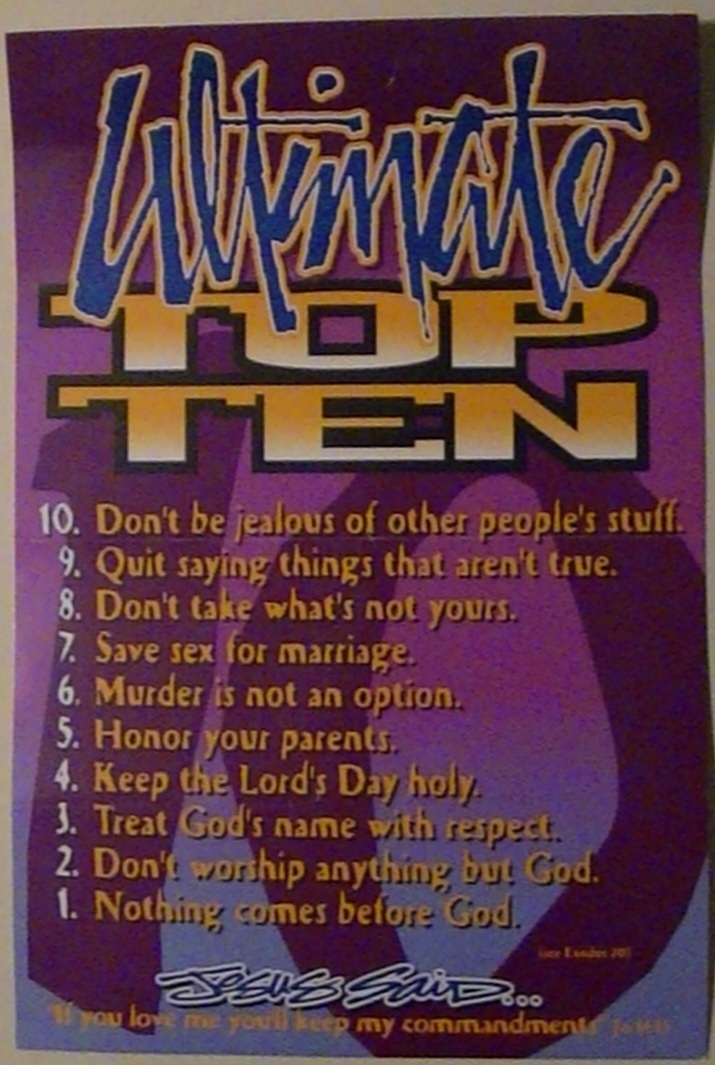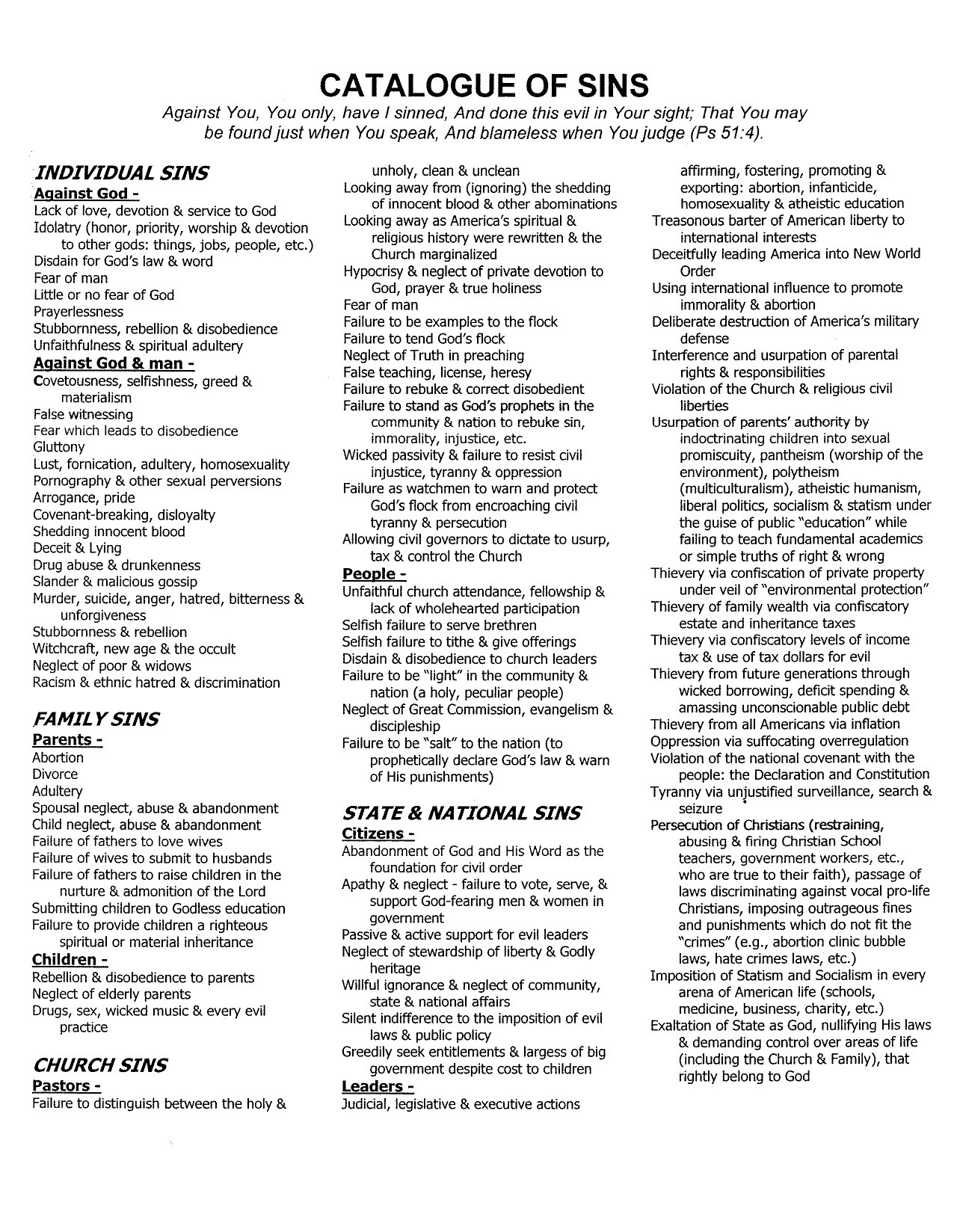10oclockdot:
On decolonizing the secretly poisonous ideologies of Christianity, 10 points.
- When I returned for a visit to the emptied-out spiritually-stagnant husk of my old home church over the holidays, I took a moment to wander through the cobwebbed basement and recover a few artifacts. Above, a youth-oriented paraphrase of the Ten Commandments which reveals much about the Christian miseducation of my upbringing. Below that, a sheet I found in an adult classroom which shows how that miseducation foments in adulthood; the list not only distorts but also invents a number of sins (including not voting, lack of wholehearted participation in fellowship, “overregulation” of private industry, multiculturalism, and “Leading America into New World Order”). Here’s also some more evidence from danforth.
- I was instructed back then that all sins are equal in the eyes of God, which means that in breaking any commandment, one becomes just as sinful as a rapist or murderer. For instance, the sins of swearing or lying or adultery equal the sin of murder. As seen in the image above, “Murder is not an option” holds equal footing with “Save sex for marriage.” I accepted this teaching.
- Of course, the Bible says “You shall not commit adultery,” not “Save sex for marriage,” which means that my teachers mistook consensual fun for the violation of a sacred promise. Their explanation: when you have sex before marriage, you’re cheating on your future spouse. I never thought to ask, “What if I don’t plan to get married?” I was also taught that both masturbation and lust counted as sins in the eyes of God. Thus, if adultery and masturbation are equivalent, then, by syllogism, masturbation and murder are equivalent.
- Plainly, this is madness. Implicitly I surmised that in order for this teaching to be true, murder must not be a sin against the person who dies, but rather a sin primarily (or solely) against God. Since no one but God could be the wronged party in masturbation, God must also be the wronged party in murder. Accordingly, I assumed that rape was only a sin because it violates God.
- Once a religion computes sinfulness in terms of a person’s relationship with God rather than in terms of a person’s relationship with other people, all other people cease to be fully people and simply become objects. In my youth, when lust was ignited by the presence of other people, I thought of them, unconsciously, as manifestations of Satan. They were temptations, not persons. I sometimes became very cruel to people I cared about. But I had been taught by masters.
- So I ask, is belief in God nearly a kind of interpersonal schizophrenia? When most of humanity’s laws can be explained in terms of a social contract without any necessary reference to the divine, what kind of mental fissures does divinity produce?
- More importantly, when a person shakes off the shackles of theistic belief, what sort of further mental decolonization is necessary before they can safely re-enter a contractarian society? As long the Christian maintains the illusion of God as a deterrent, he might mainly go on with his life sinless, which I suppose is a positive result. However, if the person begins to doubt or disbelieve, God disappears as a deterrent, and with His disappearance, actions formerly counted as sins momentarily appear to harm no one. During the extended moment in my life wherein I let go of God, I also became a small-time thief, stalking about my college campus at night, turning door handles, and when one yielded, entering. Sometimes I left only a cryptic mark behind; other times I lifted trinkets from the rooms. Pens or posterboard, items which a bureaucracy could easily and unsentimentally replace. Maybe I wanted to take back what “God” had denied me.
- It wasn’t until much later that I realized that I felt justified in these actions only because I still believed that only God would be wronged. And without a God, no one would be wronged. Or nearly so. God still lingered, incompletely exorcised, a palimpsest weakly scratched and not yet over-written. So guilt also lingered, without apparent justification, and when I made love, my partner’s body still felt like a site of sin. I could not experience pleasure without some kind of ensuing numbness or nihilism, for I had not yet built for myself a means of morality distinct from Christianity’s mutilated invections.
- For years as a youth, my mind must have torn viciously at itself trying to comprehend why pleasure was evil, or how consensual premarital sex could be as bad as rape. In my post-Christian adulthood, more conscious anxiety accompanied the decolonization. How could I be a materialist without hopelessness? How could I be sure that others were equal to myself without God decreeing it? I’m still discovering what ultimately becomes of a post-Christian set adrift. At times, I wish there were churches of atheism, because I miss the positive aspects of community and shared values. But by itself, atheism is no ethos. The world has work to do.
- Quite a lot of my last decade has been about recognizing my own privilege. My skin color is privileged, my gender is privileged, my language, my class, my upbringing, and more were all very privileged. Only in my Christian ideology was I deprived. So for those of you reading this who value evidence and logic and empiricism over blind belief, I urge you to recognize your mental state as a kind of knowledge-privilege. Indeed, how privileged was I that I was able to battle my implanted ignorance, since so many of my old Christian acquaintances continue to lack the ability or the desire to break away from the fiction of God!

